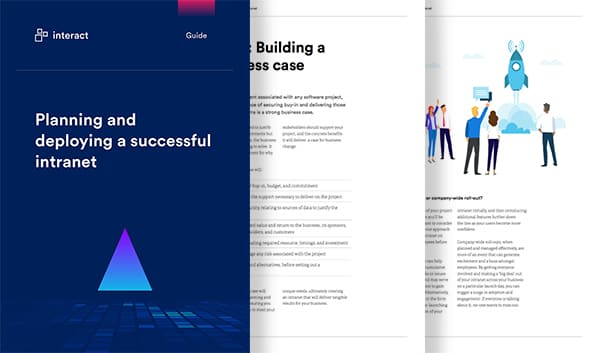If you’re in charge of keeping company culture up to scratch, you need to ask the right questions to help continually assess and improve. We’ve compiled the ideal mix of essential and outside-the-box company culture survey questions to help you make informed decisions about cultural changes.
Company culture’s significance cannot be overstated. It is the invisible force that shapes the experiences, attitudes, and dynamics of a workforce. Company culture helps to structure how employees perceive their roles, co-workers, and the organization—and it has become a focal point for senior leaders, with the connection between company culture and financial success becoming clear.
To gain a deeper understanding of company culture’s intangible yet influential aspect of your institution, it’s worth reviewing your survey questions to ensure you’re getting the most helpful responses, from understanding how effective your internal communications are, to ways you can help improve employee productivity.
Why ask employees about company culture?
Employee voices are perhaps the most important sources of insight and information when it comes to understanding your culture in its existing form and reimagining it into something that other organizations will want to emulate.
As The Workforce Institute at UKG recently revealed in its research, 74% of employees say they feel more effective and engaged when they ‘feel heard’ at work.
If you don’t implement employee listening initiatives and surveys to gather employees’ opinions and preferences, any top-down changes made to company culture may be based on potential misconceptions.
An intranet can help solve your organization’s toughest challenges
If you really want to nurture a culture that attracts talent and inspires innovation, you need to hear from as many employees as possible.
Asking the right company culture survey questions will make you better equipped to understand the unique personality of your organization, identify areas for improvement, and cultivate a work environment that aligns with your company’s vision and values.
15 company culture survey questions to elicit better responses

A simple online search will uncover countless lists of obvious company culture survey questions, but frequently asking the same routine questions can inhibit the range of responses.
To get a deeper understanding, uncover nuances, and identify areas for improvement that won’t have come to light previously, try these company culture survey questions which are a little more outside the box.
1. How well do you think the company communicates its long-term vision and goals to employees?
Assessing employees’ perceptions of the company’s ability to communicate its long-term vision can shed light on alignment and clarity within the organization. Is yours a culture where people feel connected or are they operating in silos?
2. Do you feel that the company encourages a healthy work-life balance?
This question can reveal how employees perceive the organization’s stance on work-life balance, which is crucial for wellbeing and job satisfaction. Using a free-text response will encourage people to suggest what more could be done and whether there are problems in individual departments.
3. To what extent do you believe that your colleagues support your professional growth and development?
This may appear to be a curve ball, but peer support plays an important role in employee growth and development. Internal mentoring can be a productive way to get people to talk and build strong ties outside of their immediate teams. If employees aren’t aware or don’t see it happening, however, there may need to be more attention paid to awareness raising.
An intranet can help solve your organization’s toughest challenges
4. Does the company consider diversity and inclusion in daily operations and decision-making?
Having values on your corporate website is great for marketing, but employees also want to know that these values are more than slogans. This question delves deeper into whether diversity and inclusion are not just stated values but integral components of the company’s culture. If no one has any good answers here, that suggests more needs to happen.
5. Do you feel included and that you want to participate in company rituals and traditions?
Rituals and traditions can play a significant role in shaping culture. This question explores their influence on employees’ connection to the organization. What are these rituals? It may be anything from a company softball game to a monthly all-hands meeting.
6. In your opinion, how does the company handle failure and mistakes?
The way an organization deals with setbacks can reflect its culture. Insights into this aspect can provide a more nuanced understanding of the work environment. If managers deal with failure to hit targets by punishing their direct reports, this will likely have a negative impact on employee satisfaction and retention, so it’s critical to get under the skin of what needs to change.
7. Do you feel that you’re made aware when the company makes big decisions?
Transparency in decision-making is vital for trust and morale. This question gauges whether employees feel informed and involved in those processes, whether they’re taking place at the micro-level of departments or as part of the overall strategy and company direction. The more engaged people feel with the decisions that are made, the more likely they are to feel valued.
8. To what extent do you believe the company values and integrates your feedback?
Employee feedback is invaluable for growth and this question assesses whether employees feel their feedback is genuinely considered and acted upon. Employee idea management campaigns that solicit feedback and go straight to the C-Suite can give direct suggestions for change and improvement.
9. How would you describe the level of collaboration between different departments or teams within the company?
Assessing cross-functional collaboration can reveal how well different parts of the organization work together to achieve common goals. Is the company culture separated by silos or are there processes in place that encourage people to interact beyond their peers?
10. Do you feel recognized and appreciated by different people within the organization?
This question explores the deeper impact of recognition on motivation and satisfaction, beyond just acknowledging hard work.
11. How does the company promote continuous learning and skill development for you?
Learning and development opportunities are critical factors in employee retention and engagement, and understanding how employees perceive these efforts can inform talent development strategies moving forward. A culture of learning is a happy and growing culture.
12. Are your ideas and creativity encouraged and valued by your immediate team or supervisor?
This question provides insights beyond the broader company culture and explores how micro-cultures within teams or departments impact individual creativity and innovation. Some teams may be better at this than others, so it can be helpful to identify what they are doing well and grow these practices elsewhere.
An intranet can help solve your organization’s toughest challenges
13. How well do company policies and practices support trust and autonomy?
Trust and autonomy are crucial for employee empowerment. Assessing how policies and practices contribute to these elements can guide culture improvement efforts.
14. What do you think the company could do to better align with your expectations?
This open-ended question invites employees to offer suggestions for adapting the culture to evolving trends and employee preferences. In recent years there has been much talk about corporate social responsibility and ethical capitalism; for example, do employees want to see the choices they make as consumers also reflected by their employer?
15. How would you describe the company’s recognition and celebration of diversity?
This question helps to gauge how effectively the organization promotes diversity and inclusion through the recognition and celebration of differences. Importantly, however, this isn’t just about the measurement of statistics but about how that is perceived at a lived level.
How to ask employees about company culture

When understanding and changing organizational culture, the methods you choose to gather insights from your employees can greatly influence the depth and accuracy of the information you receive. Here are several effective approaches to consider.
Pulse surveys
Pulse surveys are short, frequent questionnaires designed to gauge employee sentiment and collect real-time feedback. These surveys are an invaluable tool for gaining quick, snapshot insights into your company’s culture. Here’s how to make the most of them.
- Frequency: Conduct pulse surveys regularly to keep a continuous pulse on employee sentiment.
- Ask focused questions: Keep questions concise and focused on specific aspects of culture.
- Anonymity: Ensure anonymity to encourage honest responses, as answers are often more candid and useful when employee identities are hidden.
Employee idea management technology
Employee idea management technology is one new way to provide a platform for employees to submit their ideas, suggestions, and feedback related to company culture. It also makes it easier for you to manage responses. Here’s how to make this approach effective.
- Open channels: Create accessible channels for receiving employee ideas, whether through a dedicated platform or email.
- Feedback loops: Establish a clear process for reviewing and responding to employee submissions, demonstrating that their input is valued.
- Recognition: Recognize and reward employees for their contributions, fostering a culture of innovation and collaboration.
An intranet can help solve your organization’s toughest challenges
Focus groups
Focus groups involve gathering a small, diverse group of employees to engage in open discussions about company culture. This qualitative approach offers in-depth insights. Here’s how to conduct effective focus groups.
- Diverse representation: Select participants from various departments, levels, and backgrounds to capture a comprehensive range of perspectives.
- Facilitated discussions: Employ a skilled relationship leader to guide the conversation, ensuring that all voices are heard and valuable insights are uncovered.
- Analyze themes: After each focus group session, analyze the common themes and sentiments expressed to identify areas for improvement.
Intranet forums
Intranet forums provide an online platform for employees to share their thoughts, concerns, and ideas related to company culture. Here’s how to harness the potential of intranet forums.
- Structured discussions: Create specific forum sections dedicated to culture-related topics, encouraging employees to engage in meaningful conversations.
- Moderation: Assign moderators to ensure that discussions remain respectful and productive.
- Feedback channels: Integrate a feedback mechanism so employees can rate and comment on each other’s ideas, fostering a sense of community and collaboration.
By incorporating these methods into your strategy for understanding and improving your company’s culture, you’ll empower your employees to actively contribute to shaping the workplace environment.
Charting the path forward

A thriving company culture isn’t just a buzzword; it’s the driving force behind employee satisfaction, innovation, and long-term success. So, embrace the power of employee voices and take proactive steps to nurture a culture that sets your organization apart with these questions and pointers.
An intranet can help solve your organization’s toughest challenges
Main image Freepik.
Illustrations by vectorjuice on Freepik.


